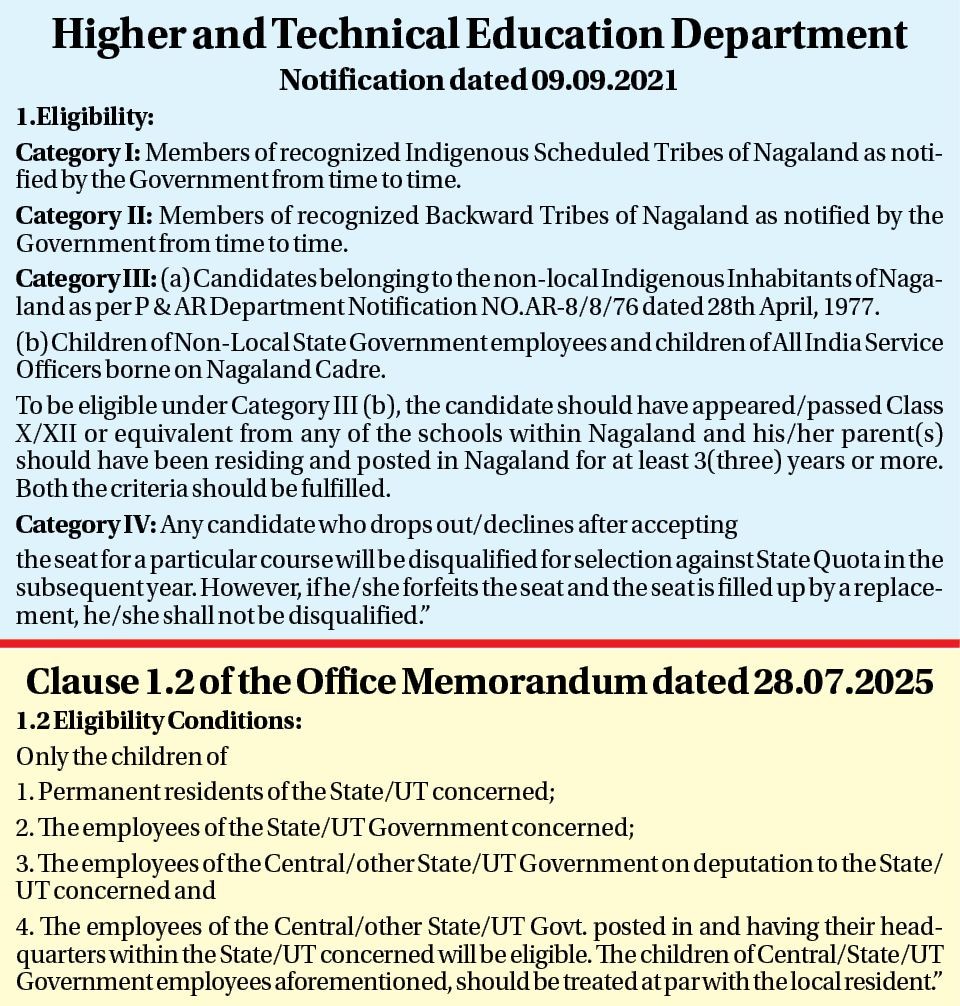
Defence wards not eligible under State’s Central Pool meant for local students, rules Court
Moa Jamir
Dimapur | October 26
The Gauhati High Court’s Division Bench has upheld the Nagaland Government’s policy restricting Central Pool MBBS seats to local students, ruling that wards of defence personnel are not eligible under the quota meant for States deficient in medical infrastructure.
Delivering the judgment on October 23, Chief Justice Ashutosh Kumar and Justice Arun Dev Choudhury set aside a Single Bench order that had earlier quashed the State’s Notification dated September 9, 2021 as “arbitrary.”
The Principal Bench found the notification consistent with Central Government guidelines on seat allocation and policy intent.
Case background
The case arises from writ petitions filed by a medical aspirant, the daughter of a serving Army officer posted with the 1 Nagaland Battalion NCC in Kohima, who was denied a seat under Nagaland’s Central Pool MBBS quota despite scoring above the cut-off in NEET-UG.
She challenged the State’s Notification dated September 9, 2021, issued by the Department of Higher and Technical Education, which laid down eligibility conditions for MBBS seats allotted to Nagaland from the Central Pool of 42 seats provided annually by the Central Government.
The petitioner contended that the notification was unsustainable as it contradicted the Union Ministry of Health and Family Welfare (MoHFW) Guidelines via a Office Memeorundum (OM) dated July 28, 2025.
These guidelines, she argued, entitled children of Central Government employees posted within a State—under Clause 1.2.4—to be treated on par with local residents.
In August 2025, a Single Bench of the Gauhati High Court accepted her contention, holding that the State’s 2021 notification was arbitrary, violative of Article 14 of the Constitution, and inconsistent with the MoHFW guidelines.
The Court therefore quashed the notification insofar as it applied to the selection of candidates for Central Pool MBBS/BDS seats for the academic year 2025–26, and directed to revision of the merit.
The Nagaland Government later appealed the ruling before the Gauhati HC Principal Bench, leading to the latest ruling.
Nagaland Govt’s argument
The Nagaland Government contended that it has the authority to frame eligibility criteria for seats allocated to it under the Central Pool scheme, which is meant to compensate States lacking medical colleges.
It argued that the Central Pool comprised of distinct sub-quotas one for deficient States and another for defence personnel. Both are managed by the MoHFW.
Since 42 MBBS and 3 BDS seats are separately earmarked each year for wards of defence personnel through the Ministry of Defence, the State maintained that dual benefit under two different quotas cannot be claimed.
Union Government’s clarification
During the course of hearings, one of the pointed queries the Bench posed to the Central Government Counsel (CGC) was whether the clause 1.2.4 of the MohFW’s July 28 OM, “The employees of the Central/other State/UT Govt. posted in and having their headquarters within the State/UT concerned will be eligible...” would include Army Officers.
As directed a letter from the Under Secretary to the Government of India addressed to the CGC dated September 17, 2025 was submitted in the Court which clarified that under the Central Pool Quota Scheme, 42 MBBS and 04 BDS seats has been allocated to Nagaland while another 42 MBBS and 03 BDS seats has also been allocated to Union Ministry of Defence for being allotment to ward of defence personnel for academic year 2025-26
So far as the matter related to treating of Army personnel as central government employee is concerned, the letter categorically clarified that (clause 1.2.4), the seats are “allocated to the State to compensate for the shortage of medical infrastructure and to provide opportunities for the students of the State to integrate into the mainstream.”
“Additionally, a separate quota is reserved for army personnel under the central pool scheme,” it added.
This clarification became central to the Division Bench’s ruling.
The ruling
After hearing the submissions, the Court observed that the two quotas, namely the Deficient-State quota and the Defence quota, serve different policy objectives and are non-interchangeable:
The Deficient-State quota is to build local medical capacity in States lacking medical colleges while the Defence quota is to recognise and reward national service.
The Bench ruled that defence personnel cannot be treated as Central Government employees for the purpose of availing benefits under Clause 1.2.4.
Once a separate quota exists for a category, dual eligibility is impermissible, the judges observed. Judicial review, they added, cannot compel the executive to merge distinct welfare schemes unless there is clear arbitrariness—which was not established here.
It concluded that the 2021 State notification was valid, the Central guidelines were not violated, and the medical aspirant was not eligible under Clauses 1.2.3 or 1.2.4.
Thus, setting aside the earlier order, the Division Bench allowed the State’s appeal (WA/260/2025) and dismissed the common Single Judge’s writ petitions concerning the issue.






